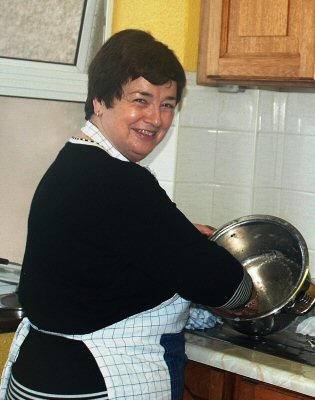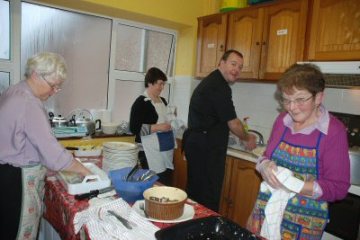Category Parish Teams
What has been achieved?
The Parish Pastoral Council – What Has Been Achieved?
The Dunhill and Fenor Parish Pastoral Council was established in December 2007. Parishioners will, no doubt, want to know what the council has been up to since then so we will attempt to satisfy their curiosity and interest by describing some of its achievements.
Early Days
At the start progress was slow because it was necessary to set up the administrative structure of the council by electing the officers, deciding on the conduct, order, and timing of meetings, and so on. In order to learn more about the role of the pastoral council, six council members attended a workshop on pastoral councils in Clonmel in February 2008. Also, one member was delegated to attend meetings of the St. Otteran’s Pastoral Area, which is the “cluster†of seven local parishes. Members of the council continue to attend training sessions or information seminars as and when they occur.
Parish Newsletters and Parish Notices
The first visible sign of the working of the council was the new Pastoral Newsletter which was edited by Marie Crowley and Mary Murphy. The first edition appeared at Easter 2008 and was followed by further editions at Summer, Autumn, and Christmas. These are still available HERE on this web site. However, the council decided later to replace the quarterly newsletters by the weekly Parish Newsletters which are available HERE.
Baptismal Team
Marie Crowley was largely responsible for putting together the baptismal team. The team members were:
| Susan Cooper Breda Halley Helena Harrington Susan Moore |
Kitty Murphy Pat O’Shea Phil Tyrrell |
The team took part in a training session in St. John’s Pastoral Centre in October 2008 and began working in the parish in January 2009. Breda Halley was the team leader.
Child Protection
Ann Marie Queally and Rita Byrne of this parish were responsible for putting together the Child Protection policy for Dunhill and Fenor. This was presented to parishioners at an open meeting in the Dunhill Enterprise Centre on 14th May 2008 and subsequently forwarded to the bishop for his approval. It is now an important part of the way in which children are cared for and protected while involved in our parish. The agreed policy may be seen HERE on this web site.
Saturday/Sunday Masses
The question of the number and the times of Masses in the parish was a topic for discussion at many pastoral council meetings. In order to hear the views of parishioners, an open parish assembly was held in the Dunhill Educational Centre on 28th October 2008 after which a decision was made to have only one Saturday Vigil Mass which was to alternate every six months between Dunhill and Fenor churches. The change was made on a trial basis to be reviewed after one year. On completion of the trial year, and after considering both the recorded attendances at the Saturday/Sunday Masses and the suggestions of parishioners, the Vigil Mass was left permanently in Fenor Church at the time of 6:30 p.m. The pastoral council continues to keep a watchful eye on Masses and Mass times.
Pastoral Council Constitution
As pastoral councils are properly constituted parish bodies, the Irish bishops require each council to have a constitution. The constitution of our pastoral council was drafted by the council and forwarded to Bishop Lee who gave it his approval in January 2009. The constitution may be viewed HERE.
Pastoral Plan
The diocesan pastoral plan Building In Faith was published towards the end of 2008. By then our pastoral council was a year old and was feeling the need to plan its work rather than deal with whatever matters just happened to arise. A planning session facilitated by Fr. Liam Power and Sr. Antoinette Dilworth was held in the Dunhill Educational Centre over three evenings in January 2009. This resulted in a pastoral plan for the period January 2009 to January 2010. The plan was published in the Parish Newsletter of Summer 2009 and may be viewed HERE.
Parish Census
One of the tasks that emerged from the pastoral plan was the setting up of a list of who lives in the parish and where they live so that collection envelopes, notices, and any other literature may be delivered correctly and efficiently. Several meetings were held with the parish collectors to decide how to gather the information. A computer data base package was purchased to make the recording of the information easier, and much of the information has now been entered into the data base by the parish secretary.
Bereavement Group
Another task from the pastoral plan was the setting up of a bereavement group in the parish. The team members were:
| Maureen Flynn Sharon Hayes Kathleen Murphy |
Kathleen O’Brien Mary Sheehan |
This group was set up in April 2009, underwent training at St. John’s Pastoral Centre later the same month, and offers bereavement support to parishioners.
Youth Programme
Several events were organised, largely by Fr. Murphy, to interest and involve young people. A successful evening of making and eating pancakes was held on Shrove Tuesday 2009 and 2010 with about twenty young people. Also, the Easter ceremonies were particularly marked by the presence and activities of scouts and young parishioners. In June 2009 a pre-exam Mass was celebrated but it was not well attended. The youth pilgrimage that was intended for summer 2009 was cancelled because of the terrible weather.
Web Site
This is another task from the pastoral plan, intended to improve communications within and without the parish. The initial web site design was provided by Maria Murphy and the content of the web pages was provided by the communications team which is a sub-group of the pastoral council. The web site contains many pages with numerous documents that can be downloaded for inspection.
In February 2012 the web site was redesigned by Stephen de Roiste and the content was provided by the communications team. A major feature of the new web site and the catalyst for the new design was the information now provided about the Fenor cemetery. This includes headstone information and grave photographs which were gathered by the graveyard team. The data base created to make this information accessible to the public was also designed by Stephen de Roiste.
In April 2011 the parish Facebook Page went live. The Page is linked to the web site but independent of it. Perhaps the most important aspect of the Page is the way it allows parishioners and any other interested people to join in the life of the parish in ways that were not possible before. The Page is regularly accessed by several hundred people, some from as far away as the UK, the USA, Australia, and Cork. There is a large following in Dublin and a dedicated few who read the Page in Polish. Most of the readers are in the 25 to 45 age group and female readers number nearly twice as many as male readers.
Liturgy Group
Following an information evening attended by Mary Dee of the Diocesan Liturgy Commission, a parish liturgy group was set up. This group has been active in advising the parish administrator on the ceremonies at Christmas, Easter, and St. Patrick’s Day and members of the group participated in the ceremonies. The group has also been involved in processions, graveyard Masses, Eucharistic Adoration, and Benediction during Lent. The members of the group were:
| Georgina Flynn Brendan Gallagher Pat Greene Mary Harney |
Tom O’Neill Ita O’Reilly Pat O’Shea |
Parish Pilgrimages
A parish pilgrimage to Mount Melleray Abbey was organised by the pastoral council for 6th June 2010, the feast of Corpus Christi. The council also organised beautiful weather for the day so that everyone had a good time, even though a good time is not normally the top priority on a pilgrimage. You can read about it and check out the photo gallery HERE.
In June 2011 the parish pilgrimage was to Rome, Italy. You can read about it and check out the photo gallery HERE.
Defribrillators
Information about defribrillators will be published shortly.
What is a Pastoral Council
The Parish Pastoral Council -Â What Is a Parish Pastoral Council?
The following explanation of the role of the pastoral council is taken from Parish Pastoral Councils – A Framework for Developing Diocesan Norms and Parish Guidelines, March 2007, Sections 4.1 and 4.3.
The Parish Pastoral Council is a leadership group through which priests and people work together as partners in furthering the mission of Christ in their own place. It does this through building up a vibrant Christian community that is rooted in baptism and marked by its faith, worship and service.
To fulfil its role the Pastoral Council needs to be a representative body, in which the diversity of the parish community is reflected. It is a means whereby all parishioners can take part in all discussions that relate to the parish and its future development.
The primary ministry of the Parish Pastoral Council is to discern the way forward for the parish at the given time. It does this in the light of the gospel, the teaching of the Church, the ‘signs of the times’ and what the Holy Spirit is saying through the members of the local community.
Processes in which the Parish Pastoral Council is involved include:
Reflection and Planning
In collaboration with the parish community, identifying their needs and the challenges they face, and reflecting in dialogue with them on what needs to be done.
Animation
Enabling the baptised to discover their gifts, in response to the needs and challenges of the parish, and developing these gifts through the provision of training and on-going formation.
Action
Providing structures that will marry the needs and the challenges of the parish with the gifts and resources in the parish and the diocese.
Communication
Ensuring that effective dialogue takes place within the parish, the diocese, and the wider community.
Evaluation
Reviewing the life and activities of the parish so that parishioners might have a sense of a developing dynamic Christian community.
The council’s pastoral interests include church liturgy, baptismal preparation, bereavement support, faith formation, communications within and without the parish, community care, and many others. Council members are not expected to carry out all of these activities themselves, though they may be involved in some of them, but it is their responsibility to empower the individuals and teams of people who do carry them out.
The pastoral council is not responsible for financial matters or for matters relating to parish property. Financial matters are the responsibility of the parish finance council while the parish property committee is responsible for the maintenance and development of parish property such as land, buildings, graveyards, car parks, etc. The pastoral council has an interest in all these matters and receives frequent reports about them but they are not the pastoral council’s responsibility.
The individuals and teams of people who assist the parish administrator maintain direct contact with him on a day-to-day basis. However, the two councils have the responsibility of establishing the teams, where they do not already exist, and of providing any necessary training, advice, assistance, or finance.
Of course, the parish administrator has overall responsibility for all parish matters and the councils and committees are there to advise and assist him.
Council Members
The Parish Pastoral Council – Council Members
Current Council Members (2016)
The names of the current council members are:
| Rt Rev Msgr Nicholas O’Mahony PP Martin Middleton (Chairperson) Stan Flynn (Secretary) Brendan Gallagher |
Carmel Dunphy Sharon Hogan Rita Byrne Kitty Murphy |
Dan Cowman Donal Lehane Helena Harrington Kathleen Murphy |
Previous Council Members (2007 – 2015)
Founding Members – December 2007
The names of the fifteen founding members are:
| Dan Cowman Marie Crowley Terry Cunningham (asst. secretary) Fr. Garrett Desmond (president) Julianna Dunne (vice-chairperson) |
Stan Flynn Brendan Gallagher Pat Greene Mary Harney Anne Kavanagh |
Donal Lehane (chairperson) Kathleen Murphy (secretary) Mary Murphy Ita O’Reilly David Raher |
Of these founding members, Anne Kavanagh resigned for personal reasons and was replaced by Gillian Connolly.
Fr. Desmond was transferred to become the parish priest of Newcastle and Fourmilewater Parish and was replaced by our then parish administrator, Fr. Paul F. Murphy.
At the council meeting of 8th September 2009 the chairperson and secretary left office as their terms had ended. Marie Crowley and Mary Murphy were elected as the new chairperson and secretary, respectively.
November 2010
As of 1st November 2010, the names of the fifteen members were:
| Gillian Connolly Dan Cowman Marie Crowley (chairperson) Terry Cunningham (asst. secretary) Julianna Dunne (vice-chairperson) |
Stan Flynn Brendan Gallagher Pat Greene Mary Harney Donal Lehane |
Kathleen Murphy Mary Murphy (secretary) Fr. Paul F. Murphy (president) Ita O’Reilly David Raher |
According to the pastoral council’s constitution, one third of the members of the council must be replaced every year, after the first three years.
An Information Leaflet and Nomination Form were prepared for distribution to parishioners after Mass on three consecutive weekends. Parishioners were requested to complete the Nomination Form attached to the leaflet and return it.
A parish meeting was held on Tuesday 2nd November to explain the purpose of the pastoral council and the role of its members. After the general meeting, those interested in membership were invited to attend a “discernment†process to help them to make a final decision.
As a result of the discernment, eight nominees were accepted as members of the pastoral council. They were commissioned as members at the pastoral council meeting on Tuesday 9th November 2010.
As of 2nd November 2010, the names of the council members were:
| Finola Cooke Gillian Connolly Dan Cowman Marie Crowley (chairperson) Wendy Cullinane Terry Cunningham (asst. secretary) |
Ann Marie Curran Julianna Dunne (vice-chairperson) Helena Fitzgerald Stan Flynn Laois Gavin Pat Greene |
Donal Lehane Paul Lynch Ned Morrissey Mary Murphy (secretary) Fr. Paul F. Murphy (president) Cait O’Donovan |
November 2011
The process of replacing approximately one third of the members each year was adopted again in October/November 2011. At that time six members resigned, namely, Dan Cowman, Maria Crowley, Terry Cunningham, Stan Flynn, Pat Greene, and Mary Murphy. All of these members had served on the council for four years as they were founder members. One new member, Peg Curran, joined the council making thirteen members in all.
Shortly before the change of membership, a new process for electing the four officers was adopted. Henceforth, each officer is to be elected for a term of one year. The vice-chairperson and assistant secretary will automatically assume the roles of chairperson and secretary when the latter come to the end of their term of office. The new officers elected at this time were Ned Morrissey (chairperson), Finola Cooke (secretary), Paul Lynch (vice-chairperson), and Ann Marie Curran (assistant secretary).
As of November 2011, the names of the council members were:
| Finola Cooke (secretary) Gillian Connolly Wendy Cullinane Ann Marie Curran (asst. secretary) Peg Curran |
Julianna Dunne Helena Fitzgerald Laois Gavin Donal Lehane Paul Lynch (vice-chairperson) |
Ned Morrissey (chairperson) Fr. Paul F. Murphy (president) Cait O’Donovan |
November 2012
On this occasion, two members resigned, namely, Donal Lehane and Julianna Dunne. Both of these members had served on the council for five years as they were founder members. Three new members, Helen Cooke, Brendan Gallagher, and Brian McMahon, joined the council making fourteen members in all. Brendan had already served a term on the council as one of the founding members.
The new officers elected at this time were Paul Lynch (chairperson), Ann Marie Curran (secretary), ?? (vice-chairperson), and ?? (assistant secretary).
As of November 2012, the names of the council members were:
| Finola Cooke Helen Cooke Gillian Connolly Wendy Cullinane Ann Marie Curran (secretary) |
Peg Curran Helena Fitzgerald Brendan Gallagher Laois Gavin Paul Lynch (chairperson) |
Brian McHatton Ned Morrissey Fr. Paul F. Murphy (president) Cait O’Donovan |
November 2013
In November 2013 Brian McHatton was elected chairperson and Helen Cooke was elected secretary.
The names of the council members were:
| Rt Rev Msgr Nicholas O’Mahony PP Brian McHatton (Chairperson) Helen Cooke (Secretary) Ann-Marie Curran Cait O’Donovan |
Ned Morrissey Brendan Gallagher Paul Lynch Carmel Dunphy Sharon Hogan |
Mary Murphy Rita Byrne Tom Drohan Martin Middleton Stan Flynn |
November 2014
In November 2014 Martin Middleton was elected chairperson and Stan Flynn was elected secretary.
The names of the council members were:
| Rt Rev Msgr Nicholas O’Mahony PP Martin Middleton (Chairperson) Stan Flynn (Secretary) Brian McHatton Helen Cooke |
Brendan Gallagher Carmel Dunphy Sharon Hogan Mary Murphy Rita Byrne |
Kitty Murphy Dan Cowman Donal Lehane Joe Burns |
The Fenor Choir
The Fenor Choir
In proving foresight may be vain:
The best-laid schemes o’ mice an’ men
Gang aft a-gley,
An’ lea’e us nought but grief an’ pain,
For promis’d joy!”
[ Robert Burns, 1759-1796 ]

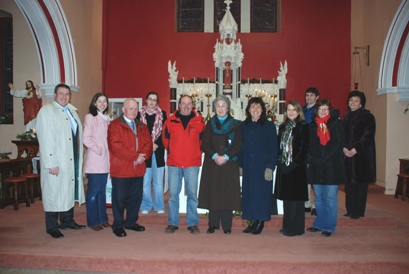
[ Picture by Geraldine Middleton ]
Who would have thought that a few wee mice could put an end to a choir? But they did! However, the choir fought back and was finally victorious, as you will learn from this piece by the choir’s musical director, Rita Byrne, who discovered the mice.
“There has been a choir in Fenor church since time immemorial but, by the early 1960s, the choir had ceased to function because the bellows of the harmonium had become the home of a colony of mice. In the 60s it was customary to have a parish mission every three years so it was necessary to have a choir for Mass and Benediction during the mission. The children’s choir in Fenor school was called on to fill the gap and so they continued from 1965 to 2005. The first job with the children was to teach the O Salutaris and the Tantum Ergo for Benediction and then the Mass of the Angels (in Latin) and Salve Regina for the Mass – all this without an organ. Confirmation came next with seven verses of Veni Creator, and Stations of the Cross during Lent had fourteen verses of Stabat Mater.
By the late 60s, the choir (now composed of school children and young teenagers) did a series of carol concerts and the proceeds, with the help of the Sale of Work, bought a very basic electric organ for the use of the school and church. This was the church organ until Father Purcell became parish priest and a beautiful Hammond organ was installed in our church. This organ was later replaced by the organ from Dunhill church which was not deemed to be of sufficient volume for the larger church.
By the early 70s the decrees of Vatican II were being implemented in the Irish Church. Quite suddenly the Latin language was replaced by English and, to the dismay of many, the beautiful chant was replaced by upbeat, catchy hymns – Bind Us Together and Kumbaya spring to mind. The young people loved the new music and, during the next twenty years, these were the norm at Masses throughout the world – Fenor was no exception.
It was the custom in our church to sing at Mass once a month with special Masses for St. Patrick’s day, Easter, and feasts of Our Lady. Fenor was blessed to have some wonderful young singers who sang solo pieces and the Psalms. Young people like Ann, Patricia, and T.P. O’Mahony, Yvonne Power, Eimear Hanley, Caitriona O’Boyle, Clodagh McElhinney, Colm and Muireann Byrne, and our present soloist Orla Forristal.

In 2008 a senior choir was organised in Fenor church and a committed group of singers came together to help with church celebrations. As was the custom, the church choir decided to sing once a month and on special Church holidays. Choir practice takes place most Tuesdays from 7:30 p.m. to 8:30 p.m. in Fenor church. It is a pleasure to be part of the very committed and enthusiastic group of singers who work so hard to make the celebration of Mass prayerful and meaningful. Fifty years on, Fenor Church Choir is still going strong.”
[ Rita Byrne, May 2010 ]
The Dunhill Choir
The Dunhill choir
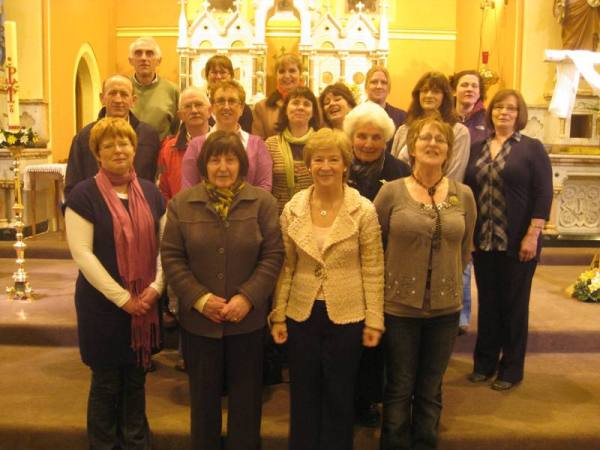
Hail to thee, blithe spirit! Bird thou never wert –
[ Percy Bysshe Shelley. 1792-1822 ]

What to do about a bird among the rafters? At least, they thought it was a bird. Might it not be wise to hang up a few precautionary bunches of garlic, just in case? Christeen Jones relates this and a few other tales of the Dunhill Choir.
“Trying to determine just how long Dunhill Church Choir has been in existence has proved to be an almost impossible task! Having spoken, at length, to some of the choir members, a couple of them finally admitted to being members for over forty years! One particular member recalls, at the tender age of eight years old, having to wait in the sacristy with her mother while the choir mistress cleared up after Mass. The reason she had to wait was to quench the oil lamps on the church walls! I think that will give you some indication as to how far back Dunhill Church Choir actually goes!
Choir members are local people of various ages and backgrounds who enjoy singing together in a friendly environment. The choir aims to be inclusive, welcoming women, men and young people of all ages and abilities, and is always looking for new members to join. You don’t have to be a great singer or be able to read music – just have a willingness to learn and join in. We are all keen amateurs. There is no formal audition and there are certainly no fees to pay. You don’t have to sing on your own either – unless you really want to!
The choir rehearses on Tuesday evenings under the guidance of our choir mistress, Margaret Moore, and our organist, Anne Kavanagh. We learn each piece of music thoroughly, varying from traditional and classical to folk, and usually include harmonies. We like a challenge and relish the mastering of more choral pieces such as Franck’s ‘Panis Angelicus’, Mozart’s ‘Ave Verum’ and various versions of the ‘Ave Maria’ – to name just a few. In more recent years we have expanded our folio to include many Taizé hymns, along with hymns written by Fr. Liam Lawton, who not only wrote the music for the ‘Millennium Mass’, but also wrote the now famous hymn ‘The Cloud’s Veil’, one of the choir’s favourites.
Dunhill Church Choir was honoured to be part of the choir which participated in the Millennium Mass celebrated in Dungarvan in 2000. The choir was also invited to join the St. Otteran’s Choir, which is made up of choir members from the churches in our pastoral area, and has sung at special Masses and carol singing services around the diocese. The choir always looks forward to Christmas and Easter services when we can take the opportunity to perform special pieces for the congregation. We also put on an annual Christmas Concert to raise funds for local charities which are always well supported and enjoyed by everyone. Well – almost always enjoyed by everyone!
We remember one year we had a ‘near miss’ when we turned up for the concert to a full church, only to discover the heating had failed! Weren’t we glad of our Santa hats and scarves that year? The congregation was totally understanding, and stayed to the end – even if their toes were frozen by the time they left! We can recall a couple of other eventful Masses over the years. On one occasion, when the choir was right in the middle of singing a hymn in three-part harmony, we had a power cut, leaving us without any music! Never let it be said that Dunhill Choir would let anyone down – being the professionals we are, the show went on and the choir sang the remainder of the hymn ‘a capella’! As it turned out, it was just the trip switch in the sacristy and a kind parishioner had it up and running again before the next hymn was due!
Another time, a bird flew into the church during Mass and, of course, being located at the highest point in the church, decided to fly around the choir loft – not a pleasant thing to happen anyway – but when your organist has a phobia about birds??

Over the last year, we have had a wonderful refurbishment of the choir loft including new carpet and soft, upholstered chairs – and we even have electric overhead heating! The parish has also purchased a new piano for the choir which complements some of the more modern hymns. Some choir members play other instruments also, including guitar, flute, violin and tin whistle. In years gone by, Dunhill had a very active youth choir whose members played many varied instruments – this is something we would love to revive in the not too distant future.
If you are interested in joining Dunhill Church Choir, or would just like more information, don’t be shy, let us know.”
(Christeen Jones, May 2010)
The Communications Team
The Communications Team
What do we do?
The parish pastoral council is ultimately responsible for communications within the parish and between the parish and external bodies such as the pastoral area, the diocese, and so on. The council has delegated some of this responsibility to the communications team, a rather grand title for the few people who are struggling to improve the way we communicate.
Much of the team’s effort has been directed at producing this web site which went on line in February 2010 with a mere half-dozen posts (pages). Now there are over 200 posts with more to come. One way in which the parish communicates with parishioners is via the newsletters which you can see HERE. The first newsletters were produced quarterly by the communications team. The weekly newsletters now in use are produced by the parish office.
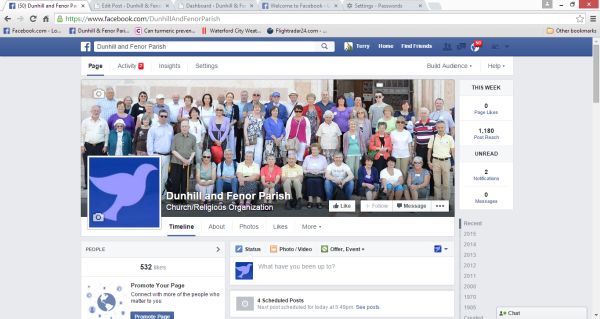
Parishioners who are unable to attend Saturday/Sunday Mass for whatever reason can “hear” Mass by tuning in to 107 FM on their radios. While this service has been available for many years, it has not been entirely successful. The transmission is necessarily of low power and many parishioners are unable to receive the signal because of obstructions such as hills, trees, other buildings, etc. There is also considerable interference from radio broadcast signals with frequencies close to 107 Mz.
If you have a computer and an internet connection (broadband is best), you can see Mass celebrated in a number of churches using a free webcast service provided by Church Services.tv. You can read all about it HERE.

Your Comms Team needs you!
This is all great stuff but we need help. We need to take on new members who will either assist with existing projects like Facebook or the web site, or will get stuck into new projects. New people have new ideas and may think of things that we haven’t thought of yet. They may have expertise that we don’t have. Maybe you would like to help out in some way. Whatever you can contribute, no matter how much or how little, we would welcome your presence on the team. Why not contact us about it? You can send an e-mail to the comms team or telephone the parish office. Contact details are on the Parish Administration Contacts page.
We look forward to hearing from you.
Pastoral Council – A brief history
The Parish Pastoral Council – A Brief History
The Second Vatican Council ended in 1965. In its decrees the Council expressed a desire to involve the laity in the work of the Church and, as a result, many parishes set up parish councils. These were meant to advise and assist the parish priest in running the parish. They operated successfully for a few years but, in the end, suffered from focussing too much on financial, material, and administrative matters to the detriment of the pastoral needs of the parish.
In 1959, Pope John XXIII announced that the Code of Canon Law (i.e., Church law) was to be completely revised. The revision was finally completed twenty-four years later in 1983. The revised Code made provision for the establishment of parish pastoral councils which were to advise and assist the parish priest in carrying out his pastoral duties. Financial matters were to be the concern of a separate parish finance council.
As the number of priests declined, the need to involve the laity became increasingly pressing and the Irish bishops began in earnest to plan for the creation of pastoral councils throughout the country. Their aim was to have a pastoral council in every parish in Ireland.
Dunhill and Fenor Parish Pastoral Council was set up in October 2007 by Fr. Garrett Desmond who was the parish administrator at the time. There were fifteen members on the council – Fr. Desmond (the president), and fourteen lay members. The new council took part in four evenings of training provided by the Diocesan Commission for Pastoral Councils and held its first meeting on 11th December 2007. At this meeting three officers were elected – the chairperson, who facilitates the regular meetings, the secretary, who records the minutes and deals with correspondence, and the assistant secretary, who is responsible for the minutes and correspondence in the secretary’s absence. A vice-chairperson, who facilitates the meetings in the absence of the chairperson, was elected at the council meeting of 16th October 2008.
A meeting of the council is held every month except July and August.
In the summer of 2008, Fr. Desmond transferred to the parish of Newcastle and Fourmilewater as the new parish priest. He was replaced by Fr. Paul F. Murphy. In December 2013, Fr. Murphy transferred to the chaplaincy service of the Department of Defense. With the transfer of Fr. Murphy the parish was left without a resident priest and the parish was then serviced by the priests of the parish of Tramore and Carbally. The parish priest of Tramore and Carbally, Monsignor Nicholas O’Mahony, took on the additional roles of administrator of Dunhill and Fenor parish and president of its parish pastoral council.
Parish Organisation
Parish Organisation
The parish administrator
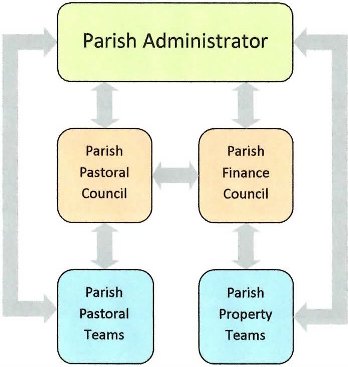
The parish administrator has the responsibility of looking after the parish. To assist him, two councils have been set up: the parish pastoral council and the parish finance council. These two councils meet regularly and maintain contact with the parish pastoral teams and the parish property teams and, of course, with each other.
The parish pastoral council
The parish pastoral council is a group of leaders that shares the responsibility for building the parish into a vibrant Christian community that promotes the gospel values of love, justice, and peace. The council normally has about fifteen members and is formally structured with a chairperson who facilitates the regular meetings and a secretary who records the minutes and deals with correspondence. The members of the council represent the pastoral activities and interests of the whole parish of Dunhill and Fenor. The parish administrator is the president of the council.
The council’s pastoral interests include church liturgy, baptismal preparation, bereavement support, faith formation, communications within and without the parish, and many others. Council members are not expected to carry out all of these activities themselves, though they may be involved in some of them, but it is their responsibility to empower the individuals and teams of people who do carry them out.
You can learn more about the parish pastoral council on the council’s own web page. Click HERE
The parish finance council
The parish finance council is the chief advisory body to the parish administrator on financial matters. It is the finance council’s responsibility to develop the annual budget, monitor its execution throughout the year, and to advise the parish administrator and the pastoral council on all matters pertaining to finance. In addition, the finance council assists the pastor in the administration of the parish property.
The parish property includes the two churches and any other buildings that require maintenance or development, the graveyards and other lands, car parks, boundary walls, and so on. Members of the finance council are not expected to look after the parish property personally. However, it is their responsibility to put in place appropriate administrative and executive structures such as a maintenance team or a development group. The parish administrator is the president of the finance council and there are seven other members.
Parish teams
The individuals and teams of people who assist the parish administrator maintain direct contact with him on a day-to-day basis. However, the two councils have the responsibility of establishing the teams, where they do not already exist, and of providing any necessary training, advice, assistance, or finance. The pastoral council is presently compiling a list of all these individuals and teams and, when this work is complete, this web page will be extended.
Parish Teams – Working together
Working Together

